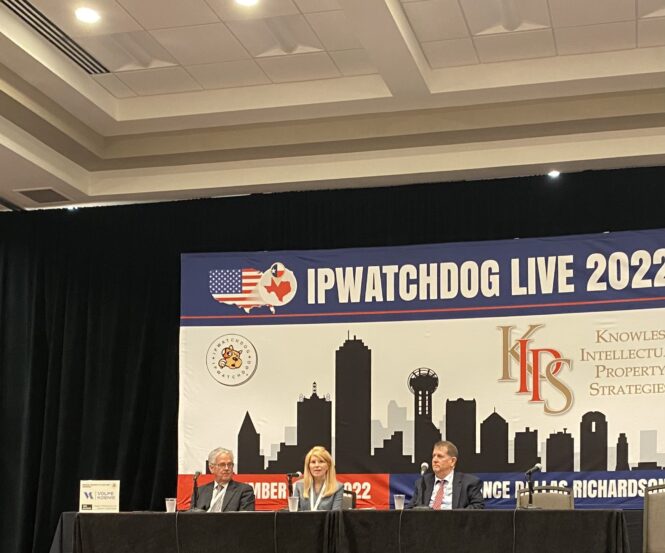
“Knowles mentioned the senators’ June letter [on patent thickets] is complicated, because it seemingly demonstrates ‘an entire lack of expertise about how legislation is made.’”

From far left: Bob Stoll, Sherry Knowles and David Jones
Throughout a session titled “Politics, Coverage and Laws” on Monday at IPWatchdog LIVE 2022, three panelists who’ve every performed a job in shaping patent legislation over time mentioned current developments in patent eligibility reform, and congressional curiosity in so-called patent thickets being fueled by continuation patents and different subjects.
On the latter level, Sherry Knowles of Knowles Mental Property Methods recalled the headline-grabbing 2007 case she introduced towards the U.S. Patent and Trademark Workplace (USPTO) whereas in her former function as GlaxoSmithKline (GSK) Chief Patent Counsel to enjoin the Workplace from promulgating substantive guidelines regarding claims and continuations observe. In June, Knowles authored an article for IPWatchdog reminding Senators Leahy, Blumenthal, Klobuchar, Cornyn, Collins and Braun, who despatched a letter to USPTO Director Kathi Vidal on June 8, that the Workplace stays below a everlasting injunction on account of the en banc determination from the U.S. Court docket of Appeals for the Federal Circuit (CAFC) that present in favor of GSK and impartial inventor, Triantafyllos Tafas. The senators’ letter requested Vidal to publish a discover of proposed rulemaking or request for feedback by September 1, 2022, addressing the problem of patent thickets, significantly within the drug trade. Nevertheless, the Workplace has not but delivered.
Knowles mentioned the senators’ June letter is complicated because it seemingly demonstrates “an entire lack of expertise about how legislation is made.” She added: “How does Congress not perceive that it’s their job to create legislation within the space of patents and to be the watchdog on this space?”
David Jones of the Excessive-Tech Inventors Alliance (HTIA) addressed the problem of Part 101 reform, through which the HTIA has been actively concerned. Jones mentioned that, whereas he agreed with former USPTO Director Andrei Iancu’s tackle a earlier panel that each different nation has discovered how you can get eligibility proper and there’s a clear path to creating Part 101 work, it finally doesn’t matter a lot in instances like American Axle as a result of the outcome was right because it was a nasty patent in his opinion. Many within the viewers and on the panel strongly disagreed with this view, explaining that improperly utilizing a Part 101 evaluation to deal with points extra acceptable for Sections 103 and 112, for example, creates confusion for all patent house owners and practitioners and creates a physique of ambiguous legislation.
Whereas the USPTO has taken steps to make the eligibility evaluation simpler for examiners by way of its steering below former USPTO Director Andrei Iancu and thru the “Deferred Topic Matter Eligibility Response (DSMER) pilot program, for example, the courts stay muddled, mentioned panelists. Whereas some disagreed on whether or not eligibility rejections are nonetheless an issue in prosecution, Bob Stoll of Faegre Drinker, who moderated the panel, and others mentioned a minimum of the instruments are there for the Workplace to keep away from granting unhealthy patents with out having to rely so closely on Part 101. Nevertheless, that doesn’t a lot matter if the courts merely overturn these selections. “For those who take a look at the evolution of the European Patent Workplace, they software what they used to do on the eligibility aspect and put it into ingenious step—if we did that in the US there could be lots much less stress on 101,” Jones advised.
Stoll subsequent requested the panelists whether or not Senator Thom Tillis’ “Patent Eligibility Restoration Act,” launched in August, or different laws to deal with Part 101 reform, has any likelihood of passing within the subsequent 5 years. Each Knowles and Jones agreed in all probability not. “At all times guess towards laws,” Jones mentioned. Knowles famous that the invoice was launched by Tillis with none cosponsors, which doesn’t bode nicely. “I’d prefer to see a cosponsor,” she mentioned. Nevertheless, Jones mentioned it might be Tillis’ intention to easily set the stage for his agenda for subsequent 12 months by rapidly introducing the invoice, or to stress the Supreme Court docket to lastly act in order that the invoice turns into moot.
Knowles pointed attendees to an article she and her colleague, Anthony Prosser, authored in 2018, titled “Unconstitutional Utility of 35 U.S.C. §101 by the U.S. Supreme Court docket”, 18 J. Marshall Rev. Intell. Prop. L. 144 (2018) that analyzed each iteration of the eligibility statute since 1790. She mentioned the conclusion was that it couldn’t be clearer that the U.S. Supreme Court docket is unconstitutionally making use of the legislation, as a result of “there aren’t any exceptions” within the statute, and by no means have been.
With the Court docket and Congress seemingly stymied, “all of the motion [on 101] will likely be on the USPTO,” Jones mentioned.

